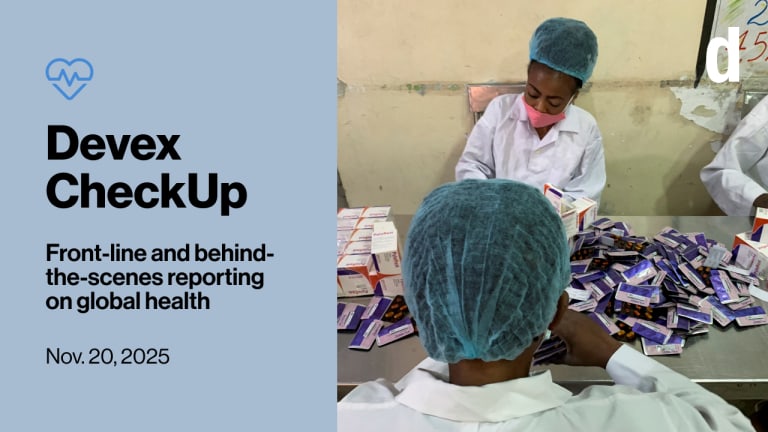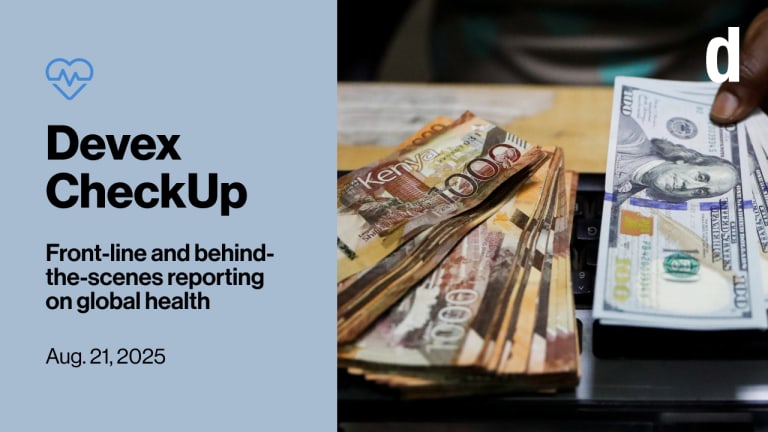
Monkeypox — officially a public health emergency of international concern since a WHO declaration last month — has spread across six continents. African countries have recorded seven of the 12 deaths so far, but as with COVID-19, they have watched as higher-income nations divide up the available supplies of vaccines and treatments.
This is a preview of Devex CheckUp
Sign up to this newsletter for exclusive global health news and insider insights, in your inbox every Thursday.
WHO’s declaration itself sparked allegations of Africa being ignored, given that monkeypox was already endemic in several African countries. It remains to be seen if the PHEIC status will mean anything concrete for the continent.
• Experts fear that once the outbreak is under control in other parts of the world, the urgency around it will subside, leaving Africa in the same situation as before. Only one company — Bavarian Nordic — has the patent to produce the monkeypox vaccine and its output has temporarily ground to a halt. Countries are now competing for 16.4 million doses that currently exist, with no new supplies expected to be available until 2023. The United States has already claimed the bulk of the available doses, and WHO officials have warned that the remaining supplies could go to the highest bidders.
• Dr. Githinji Gitahi, the group CEO at Amref Health Africa, writes in an op-ed for Devex that the continent has not received a single dose of monkeypox vaccine despite WHO stockpiles. “The tools to detect and prevent the outbreak have been available — just not to Africa,” he writes.
• The disease has been circulating in corners of West and Central Africa for decades, where it received little notice from global health officials or pharmaceutical companies. Even after hundreds of people were infected in a 2017 outbreak in Nigeria, there were no increased efforts to vaccinate the vulnerable population.
• “Nigeria is the missed signal that once we start seeing transmission, we could have a problem,” WHO’s Ambrose Talisuna tells Devex contributing reporter Andrew Green. “It was a failure on all of us not to have seen that and developed tools.”
• Apart from vaccines, there are also not enough tests and health workers trained to administer them, which would allow officials to understand the scale of the outbreak and how it is being transmitted.
• Another challenge is that of genome sequencing. With global attention focused on the variant clade II, which appears to be responsible for the outbreak in Europe and North America, researchers might neglect clade I, which is prominent in the Congo basin.
• Will a sense of accountability prevail? As Boghuma Titanji, an infectious disease expert at Emory University puts it: “I’d like to see something beyond just statements and calls for solidarity.”
Read: Is monkeypox an emergency except when it’s in Africa?
Opinion: Africa, it’s time to take charge of our health agenda
Lessons from Ethiopia
Before 2005, abortion was illegal in Ethiopia except in rare cases, and unsafe abortion was the highest contributor to maternal death — nearly 25,000 women were estimated to have died as a result between 1995 and 2000. All that changed in 2005, when the country’s laws changed to allow abortions under a broader set of circumstances. Now, health professionals in Ethiopia are anxiously eyeing the U.S., specifically the recent Supreme Court decision to overturn Roe v. Wade, in case it signals a global shift, our colleague Sara Jerving reports.
• It took years of advocacy and a push from civil society organizations for the government to allow abortion in more cases. While unsafe abortion led to about a third of maternal deaths before the change in law, by 2016, less than 1% of maternal deaths were attributed to complications from abortion.
• It’s not an isolated example. Before Nepal expanded abortion access in 2002, over half of maternal deaths in major hospitals were attributed to unsafe abortions. Since abortion was legalized in Mexico City in 2007, there has been an 80% reduction in abortion-related emergency cases and there have been no abortion-related deaths.
• A lot rests on the U.S., and the implications of the reversal of Roe v. Wade will be felt globally. “The U.S. has lots of influence — directly or indirectly — on Ethiopia and other African countries,” Dr. Muir Kassa, an Ethiopian gynecologist, tells Sara.
Read: Ethiopia expanded access to abortions and it saved lives
ICYMI: Bracing for global impact as Roe v. Wade abortion decision overturned
Reflect on replenishment
At the 75th World Health Assembly in May, countries adopted recommendations to provide more flexible funding to WHO, including a potential increase in dues from member states within eight years.
Several experts are optimistic that this will happen. But even if it does, WHO will still need other flexible funding sources to pay for its work.
That’s why the WHA also agreed for the agency to consider adopting a replenishment mechanism, like those used by the Global Partnership for Education and the Global Fund to Fight AIDS, Tuberculosis and Malaria. But can WHO pull it off? Experts tell Jenny that some of WHO’s specific strengths might play into a potential replenishment.
They add that the agency could also learn a few things from the Global Fund and GPE.
Read: What WHO can learn from different replenishment models (Pro)
+ A Devex Pro membership offers deeper analysis of the development sector, exclusive digital events, and access to the world’s largest global development job board. Start your 15-day free trial.
Mea culpa?
Two years after Wellcome acknowledged that it perpetuated racism in its work, a recent external evaluation found that institutional and systemic racism still exists in the organization. In response, Wellcome outlined steps to do better, both as a funder and an employer.
“We know that Wellcome has great power. We have done too little to use this power to counter racial inequity in research,” director Jeremy Farrar said in a statement.
Related: Countries demand answers from WHO amid racism scandal
+ Which other organizations need a similar rethink of their work? Let us know at checkup@devex.com, and we will investigate further.
What we’re reading
Funding for Zika disease research has dried up as the world focuses on other diseases. [The New York Times]
AstraZeneca heads to court to enforce a noncompete agreement as a former executive joins GSK. [Financial Times]
A measles outbreak in Zimbabwe has infected thousands of people and killed at least 157 children. [VOA]










